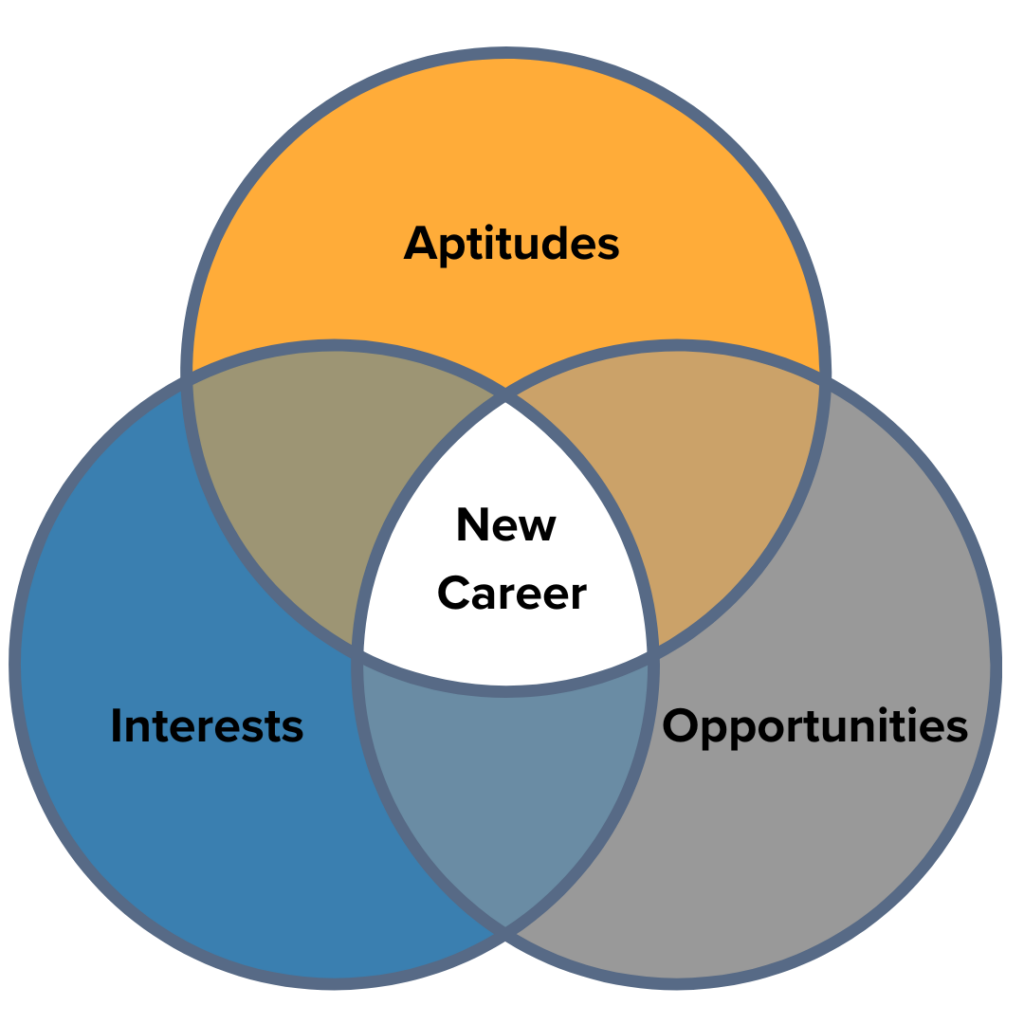Career Resources for Adults
Incorporating your aptitudes into your daily work is one of the best ways to achieve career-long satisfaction and success. When you’re evaluating career directions, think about which ones bring your aptitudes, interests, and opportunities into alignment.
The first step in this journey is often to research different careers or roles that use your aptitudes. You might be able to tweak your current career to make it a better match, or you might be inspired to make the leap to something completely new. These resources can get you started with general career research, as well as ideas for gaining experience in a new field.
Career Paths
The U.S. government sponsors a number of data-rich and straight-forward career exploration sites where you can learn more about different careers:
- The Department of Labor’s O*NET is a widely-used resource where you can look up specific careers or browse by categories like “Abilities,” “Interests,” and “Work Styles” (there’s lots of overlap with our aptitudes here!). The O*Net also incorporates the interest codes from the Self-Directed Search interest survey we administer, so make this your first stop if you liked working with that resource.
- CareerOneStop is another thorough site for data on wages and trends in various fields. They also have a Training category to help you find ways to retrain, including lists of apprenticeships, scholarships, and short-term training centers.
- Finally, check out the Occupational Outlook Handbook where you can search by parameters like “fastest growing” careers. Their Field of Degree category is an interesting feature that shows you occupational data by college major or degree.

Resources for Specific Career Paths
- Interested in nonprofit work? The Idealist platform is for you. You’ll find openings in the nonprofit sector as well as general career advice. If you’ve ever dreamed of starting your own nonprofit, you’ll want to check out their free Action Incubator to help you turn your idea into reality.
- Are you a natural problem-solver looking for a social impact career? The site 80,000 Hours has an interesting take on how to choose a profession that solves the world’s toughest problems. They have an extensive career guide that’s also available as a free audiobook.
- Guides to tech careers are plentiful, but Tech Guide stands out for its simple interface and information on 50 different careers organized by categories like Design, Engineering, and Fintech. There’s a nice mix of spatial and non-spatial ideas here for you to explore.
- There’s more to trades besides carpentry and plumbing. Head over to Indeed for their Definitive Guide to Skilled Trades Training Paths or learn more about 31 different trade pathways in this guide to Skilled Trades Programs.
- If your aptitudes point to the arts, the Art Career Project is an in-depth and practical resource for exploring a range of artistic and art-adjacent careers in categories like Fine Art, Applied Art, Culinary, and Music.
- Thinking about a career in healthcare? The Mayo Clinic College of Medicine website has information on 40 different roles in that field. The Explore Health Careers site is another good resource that includes information about lesser known career paths like medical librarian and built environment specialist.
General Career Advice
There are many sites out there for broad career guidance. These offer a mix of tips for landing a job, information about specific career paths, and more.
- The Muse is a jobs board, a coaching platform, and a career advice blog all in one. You can search for job openings by state and title (they have 100 different titles available from cashier to senior manager) or learn about companies they partner with across the U.S. Their coaching platform offers a range of professionals offering remote career counseling services like resume reviews and job search strategy help. You’ll also find lots of articles to choose from in their Advice category, including an entire section devoted to changing careers. We’ve been included on their list of best career assessments in the past.
- Indeed is another resource with a deep career advice section. Here you’ll find tips for almost any career stage or issue, whether you’re seeking a new job, considering a career change, or starting a new role. They also have a robust “How To Become A…” series that you can also use to learn more about different occupations.
Classes and Volunteering
Taking a class or volunteering for something new can be a good way to assess what a field is really like and build experience. Most universities offer continuing education programs, and community colleges can also be an affordable way to learn. You might also explore online learning platforms like the ones below.
Online Learning Platforms
- LinkedIn Learning is a well-organized learning platform with lessons in business, technology, and digital fields, as well as advice about writing resumes, planning your career, and more. They have structured training pathways, and you can even earn a professional certificate or academic credits. Check your local library to see if they offer free access for cardholders.
- Coursera is another classic resource in this space, offering individual courses, certificates, and online degrees in partnership with accredited universities. Here you can find opportunities to learn new skills or take a general interest university course in areas like the humanities.
- edX has a similar model to Coursera with courses, certificates, and degree programs offered by universities around the world. Most courses have the option to audit for free. Check out their Verizon Skill Forward program offering free access to a number of certificates in business and technology.
Volunteering Platforms
- Catchafire and Taproot are two platforms that connect volunteers with remote nonprofit projects. Both platforms let you search by issue or skill area and offer projects of varying lengths, some as short as a phone call.
- VolunteerMatch offers a mix of virtual and in-person opportunities. You’ll find a pretty broad collection of volunteer roles that aren’t tied to any particular skillset.
















